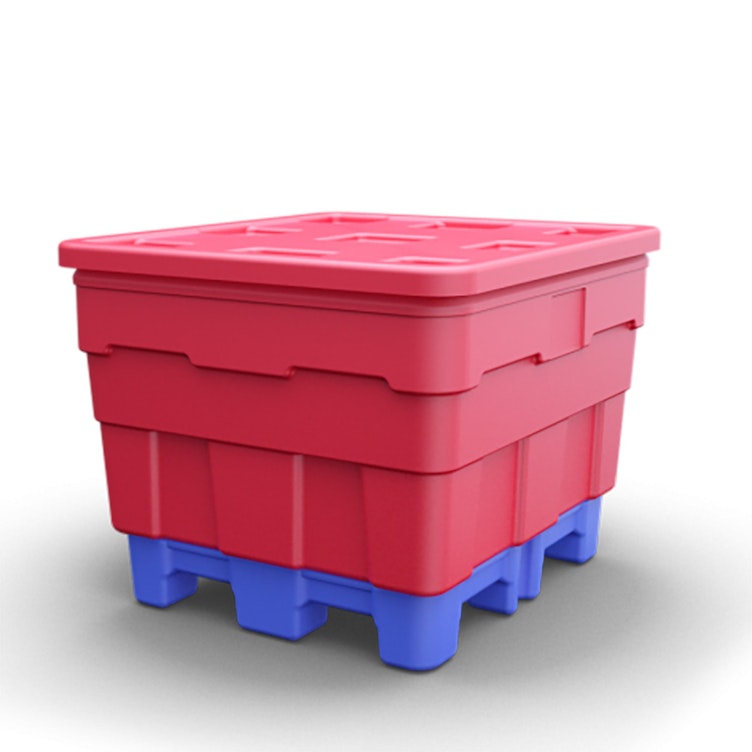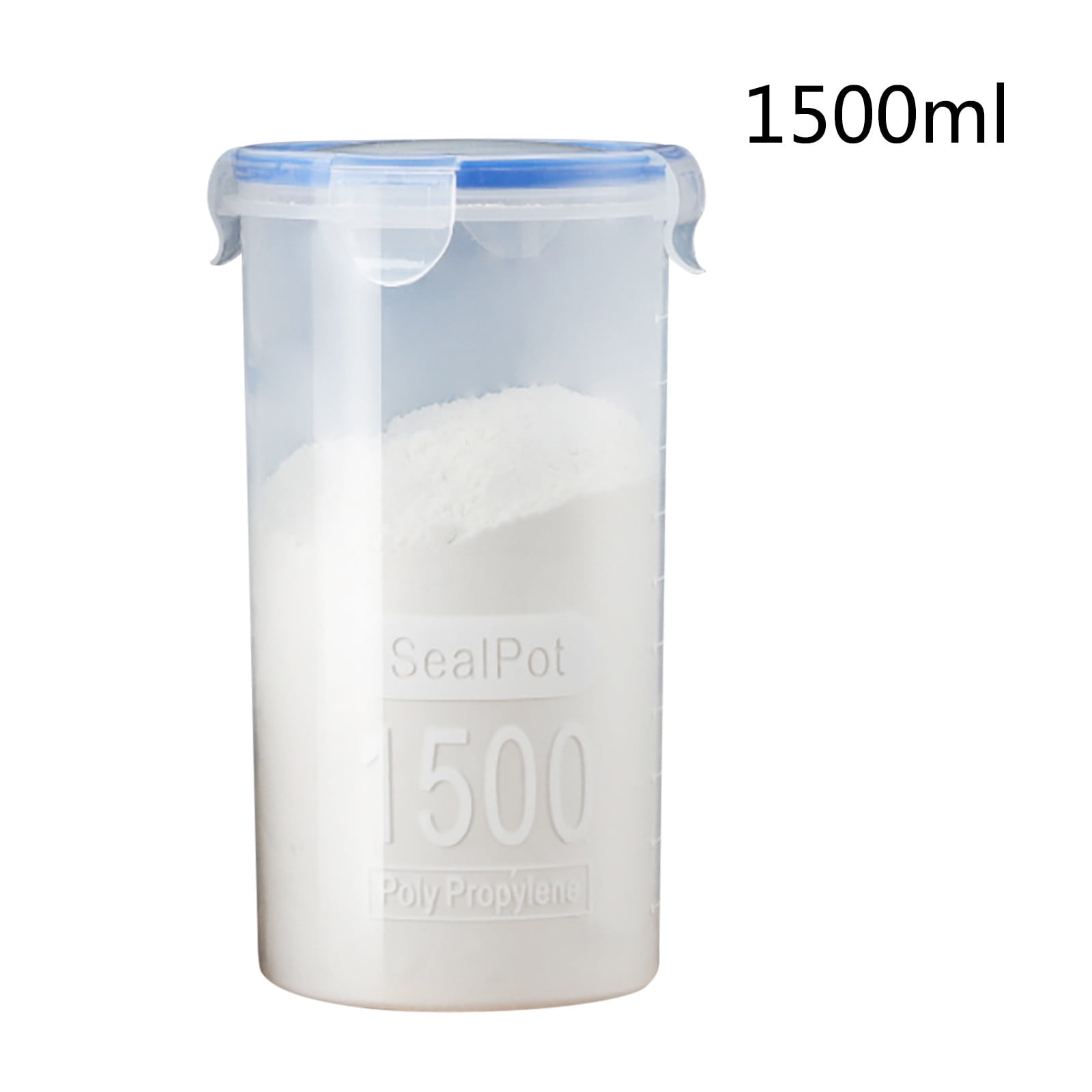Discover creative ways to organize goods with plastic bulk containers
Wiki Article
The Role of Bulk Plastic Containers in Effective Recycling Practices and Sustainability
Mass plastic containers are essential to contemporary reusing initiatives. Their style enhances the effectiveness of material collection and transportation, adding to sustainability objectives. These containers not only maximize space yet likewise aid in keeping an eye on contamination degrees. However, their application is not without challenges. Recognizing the full scope of their effect exposes a complicated connection in between logistics and ecological responsibility that warrants further expedition.Understanding Mass Plastic Containers
Bulk plastic containers act as an essential part in numerous markets, facilitating the storage and transportation of products. These containers are generally made from robust materials such as high-density polyethylene (HDPE) or polypropylene, which offer durability and resistance to ecological elements. Their style commonly consists of features like stackability and modularity, permitting reliable use area throughout both storage space and transit.Industries such as agriculture, food processing, and producing often utilize mass plastic containers due to their light-weight nature and ease of handling. The containers can be found in numerous dimensions and configurations, satisfying the certain requirements of different products. Their adaptability prolongs past mere performance; they can likewise be customized with covers, deals with, and labeling alternatives to enhance use - plastic bulk containers. As a result, bulk plastic containers play a crucial role in enhancing logistics and supply chain procedures across numerous sectors, consequently adding to general effectiveness and cost-effectiveness
Benefits of Utilizing Bulk Plastic Containers in Recycling
When companies prioritize reusing initiatives, the use of bulk plastic containers greatly improves the efficiency of the process. These containers are created to enhance area, enabling the storage and transportation of larger amounts of recyclable materials. This causes fewer journeys to recycling centers, therefore reducing fuel intake and linked exhausts.Furthermore, bulk plastic containers are sturdy and immune to different environmental variables, guaranteeing that materials continue to be safeguarded throughout handling and transit. Their lightweight design additionally contributes to lower transportation costs.
Furthermore, the harmony of these containers facilitates far better sorting and handling of recyclable materials, which can boost general recycling prices - bulk plastic containers for sale. Organizations that adopt bulk plastic containers likewise show a dedication to sustainability, favorably affecting their brand picture. Inevitably, these benefits not just enhance recycling techniques but also contribute to more comprehensive ecological goals
Just How Bulk Plastic Containers Facilitate Product Collection
Efficient product collection is significantly enhanced by the usage of bulk plastic containers, as they provide a organized and reliable solution for gathering recyclable items. These containers are created to fit huge volumes of materials, which simplifies the sorting and storage space procedure. Their stackable design takes full advantage of area utilization, making it simpler for facilities to arrange recyclables without clutter.Furthermore, bulk plastic containers are sturdy and weather-resistant, permitting for exterior placement without degradation. This strength ensures that materials stay safeguarded until they are collected for processing.

The uniformity in size and shape of these containers helps with standardization across collection factors, enabling far better monitoring of recyclable quantities. Their clear nature allows for very easy visibility of components, assisting in the surveillance of contamination levels and ensuring that only ideal materials are gathered. Generally, bulk plastic containers play an important duty in simplifying the product collection procedure, consequently promoting efficient reusing techniques.
Transportation Performance and Environmental Effect
Transport performance plays a vital role in the recycling process, particularly through the optimization of load capacity in bulk plastic containers. By making best use of the volume of product transferred, business can substantially decrease the variety of trips required, consequently minimizing their carbon footprint. This strategy not only boosts operational performance yet likewise adds to extra lasting ecological practices.
Optimizing Lots Capability
Optimizing tons capability is typically overlooked, it plays a vital duty in boosting transport effectiveness and minimizing ecological effect in recycling techniques. By maximizing the quantity that bulk plastic containers can hold, reusing procedures can minimize the variety of trips required for transportation. This not just reduces fuel intake yet additionally decreases the deterioration on cars. Efficient load monitoring enables facilities to utilize space properly, making sure that each transportation cycle is as productive as possible. In addition, well-optimized loads can bring about far better settlements with logistics suppliers, possibly reducing general expenses. Ultimately, improving load capability adds to a more sustainable recycling system by cultivating effective source use and lessening waste produced during transport.Minimizing Carbon Footprint
As reusing procedures undertaking to lessen their environmental influence, decreasing the carbon footprint linked with transportation becomes an essential objective. Mass plastic containers play an essential duty in achieving this aim by improving lots efficiency and optimizing logistics. Their lightweight yet sturdy design permits for maximum freight room usage, lowering the number of trips required to deliver materials. By settling deliveries, reusing facilities can reduce fuel consumption and greenhouse gas emissions. On top of that, strategically locating recycling facilities decreases transport ranges, furthermore reducing carbon outputs. Utilizing fuel-efficient vehicles and alternate energy sources improves total sustainability. By incorporating these practices, the reusing you can find out more industry can substantially reduce its carbon footprint, adding to a more lasting future.Difficulties in using Mass Plastic Containers

Contamination Problems
Contamination issues stand for a considerable challenge in the efficient usage of bulk plastic containers within reusing methods. These containers commonly collect residues from previous materials, bring about combined products that can impede the reusing procedure. Pollutants such as food waste, chemicals, or non-recyclable products can compromise the honesty of the whole batch, resulting in boosted disposal expenses and lowered reusing rates. In addition, inappropriate cleaning or sorting can aggravate these issues, making it hard for reusing facilities to process products effectively. The visibility of contaminants not just influences the top quality of recycled products however additionally weakens the total sustainability initiatives focused on reducing plastic waste. Resolving these contamination challenges is critical for boosting the effectiveness of mass plastic container recycling.Recycling Infrastructure Limitations
Ineffectiveness in reusing infrastructure positions significant challenges for the effective management of mass plastic containers. Several reusing centers lack the capability to process huge quantities of these containers efficiently, causing boosted prices and delays. Additionally, poor arranging technologies commonly lead to contamination, as mass containers might be mixed with other products, making complex the recycling process. Minimal transport choices also hinder the movement of bulk plastic containers to suitable recycling facilities, resulting in increased land fill waste. Furthermore, a lack of standard procedures for bulk container recycling develops confusion among customers and services, further making complex efforts to advertise sustainability. Dealing with these you could check here framework restrictions is vital to enhance reusing methods and take full advantage of the potential of bulk plastic containers in a circular economic situation.Ideal Practices for Executing Mass Plastic Containers
When companies consider implementing mass plastic containers in their recycling methods, they need to prioritize a calculated approach that enhances performance and decreases contamination threats. Picking the ideal container size and type is vital to suit the volume of materials being processed. Organizations should also establish clear labeling and signage to lead customers on correct disposal methods, decreasing confusion and mistakes. Routine training sessions for staff can additionally reinforce these techniques, making certain everyone comprehends their functions in maintaining recycling integrity.
Furthermore, companies ought to carry out a regular maintenance routine to examine and clean containers, preventing the buildup of contaminants. Partnering with local reusing centers can additionally simplify the collection procedure, making sure that materials are efficiently refined. Lastly, organizations need to monitor and review their reusing metrics, using this data to improve methods gradually and advertise constant renovation in their sustainability efforts.
The Future of Bulk Plastic Containers in Lasting Practices
As organizations progressively prioritize sustainability, the role of mass plastic containers in recycling methods is established to advance significantly. Technologies in materials scientific research are resulting in the advancement of eco-friendly and recyclable options, enhancing the ecological benefits of bulk plastic containers. Furthermore, the implementation of closed-loop systems will certainly enable for less complicated collection and repurposing of these containers, lowering waste and source intake.Technical developments, such as wise radar, will certainly allow companies to check the lifecycle of bulk containers, enhancing effectiveness in recycling processes. As consumer need for sustainable practices expands, companies will likely take on bulk plastic containers made for reuse and long-lasting value. Moreover, cooperation between federal governments and sectors will promote the facility of standardized reusing methods, making sure that bulk containers are effectively incorporated into broader sustainability efforts. In general, the future of mass plastic containers appears encouraging, with substantial capacity for adding to a circular economic situation.
Often Asked Questions
Exactly How Are Bulk Plastic Containers Made and What Products Are Utilized?
Mass plastic containers are commonly made from high-density polyethylene (HDPE) or polypropylene (PP) These materials are refined via shot molding or blow molding strategies, causing resilient, light-weight containers ideal for various storage and transport demands.
Can Bulk Plastic Containers Be Reused Numerous Times Prior To Recycling?
Yes, bulk plastic containers can be recycled several times prior to reusing. Their resilience and layout permit repeated usage in Get More Info different applications, advertising sustainability and source effectiveness while lowering the requirement for new containers.
What Accreditations Exist for Bulk Plastic Containers in Recycling?
Numerous qualifications for bulk plastic containers consist of the Recycling Partnership's certification, the Cradle to Cradle Qualified ™ criterion, and the Lasting Product packaging Union's standards, making sure containers meet specific ecological and recyclability requirements for efficient recycling.Exactly How Do Bulk Plastic Containers Contrast to Other Recycling Storage Space Options?
Bulk plastic containers supply greater durability and ability compared to various other reusing storage choices, lowering the risk of contamination and promoting efficient transport. Their layout supports better company, improving overall efficiency in recycling procedures.What Is the Lifespan of a Bulk Plastic Container in Recycling Processes?
The life expectancy of a mass plastic container in reusing processes normally varies from 5 to 10 years, depending upon use, worldly top quality, and environmental conditions, enabling multiple cycles of use prior to ultimate disposal or recycling.When companies prioritize recycling initiatives, the application of mass plastic containers substantially improves the efficiency of the process. Transportation efficiency plays an essential role in the reusing procedure, specifically with the optimization of load capability in bulk plastic containers. The use of mass plastic containers in reusing methods faces considerable obstacles, specifically concerning contamination concerns and constraints within reusing framework. Contamination problems represent a considerable difficulty in the efficient usage of bulk plastic containers within reusing methods. When companies take into consideration applying bulk plastic containers in their recycling methods, they ought to prioritize a tactical method that enhances effectiveness and decreases contamination risks.
Report this wiki page